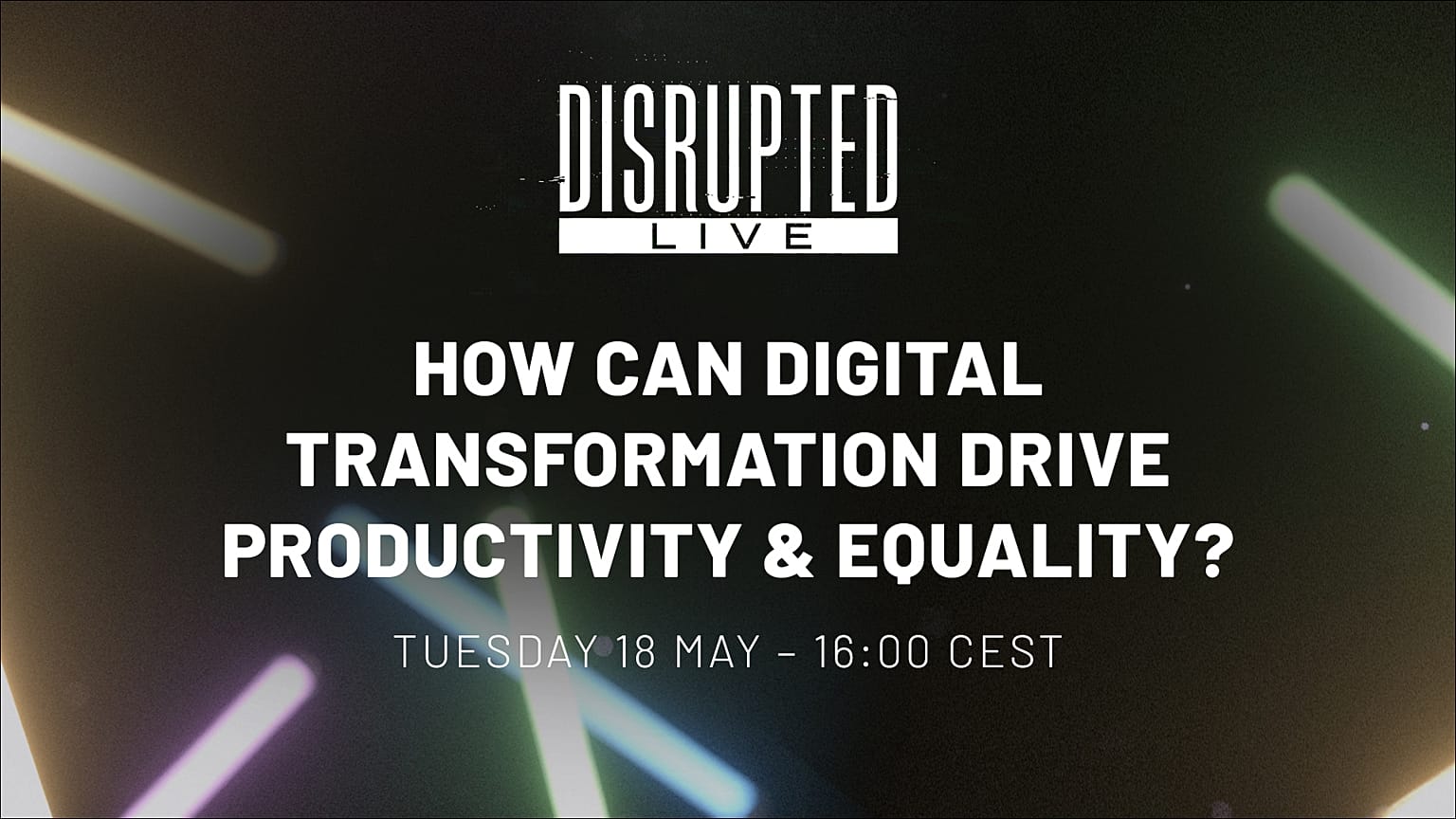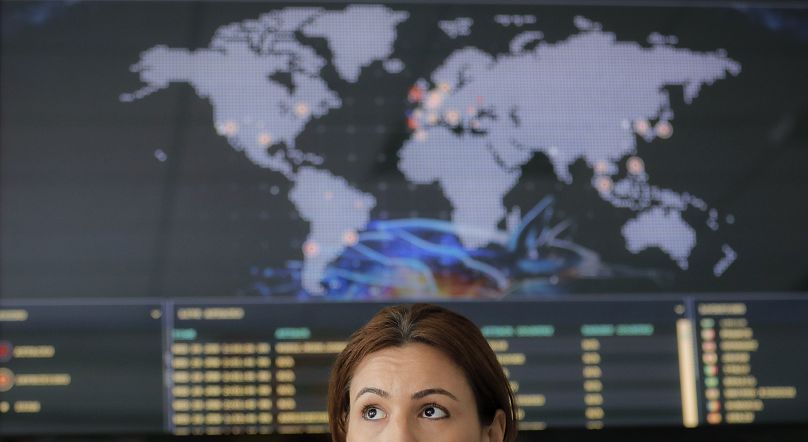COVID-19 has fast-tracked the world's digital transformation. How can businesses and workers make the most of it? Euronews' Disrupted Live debate put this question and more to some of the key thinkers and digital players in Europe.
The global pandemic has accelerated the world’s digital transformation. Businesses that were lagging behind have been forced to fast-track their efforts, faced with the choice of going digital or shutting up shop.
Amid lockdowns and restrictions, interaction between staff and their customers has become increasingly contactless, with it going completely virtual in many cases.
The health crisis has left millions of workers stuck at home, transforming a bedroom or living area into a new type of office. This has created an immediate challenge for many businesses in making sure their workforce has the right equipment, which in many cases includes a stable internet connection and secure access to the company's intranet and workspaces, to be able to fulfil the requirements of their jobs.
The sudden shift to working from home and businesses going remote has seen many processes digitised, from staff meetings, presentations and customer interaction, to business travel and transactions that had until now traditionally been done on paper.
What challenges does this fast-tracked digital transformation mean for businesses? For SMEs, where do the investment and know-how come from? How can global, digital divides be bridged so that nobody is left behind? What does it mean for accessibility, equality and the gender gap?
What kind of upskilling and training do workers require to thrive in a fully digitalised environment? What new opportunities does this all open up? And what role do global governments and EU public institutions play in supporting this transition?
Euronews' Disrupted Live debate put these questions and more to some of the key thinkers and digital players in Europe.
You can watch the full debate back here:
How has COVID-19 accelerated digital transformation?
According to a Euronews online poll, 66.7% of respondents said the pandemic had considerably accelerated the digital transformation of their workplace and another 33.3% said it had somewhat accelerated it.
Audrey Plonk, Head of the Digital Economy Policy Division at the OECD told Euronews that teleworking during lockdown was close to its full potential in almost every sector.
"While there was a slight decrease in teleworking as the restrictions eased up, it's very far from pre-COVID levels," she said. The data she presented was from an Italian case study but similar trends were observed across all developed economies.
Recent research suggests that digitalisation was not only a prerequisite for businesses to survive during the COVID-19 crisis, but also necessary for them to recover from it more quickly.
"This is where you start seeing some kind of uneven impact of the crisis. Those companies that were faster in digitalising -- perhaps they're also selling solutions to other companies and other sectors -- those have done particularly well," said Malte Lohan, Director General of Orgalim, Europe’s Technology Industries.
What are the requirements in terms of skills and infrastructure?
But going digital is a complex process. It requires deploying extensive digital infrastructures and developing new skills in the workforce.
"In order to achieve meaningful engagement with the digital economy, people need both numeracy and literacy skills. It's not sufficient to just give them a piece of technology and expect them to learn how to use a laptop," Plonk said.
Yves Bernaert, Senior Managing Director for Europe at Accenture Technology said that beyond mere technical skills**,** it was crucial to train people to adapt themselves quickly.
Digital transformation furthermore requires careful thought and planning to ensure that it not only brings productivity and efficiency but also does not expose businesses and consumer to new risks.
"There have been more challenge related to security because the more you go digital, the more you open your system and you have to interconnect not only within your company, but you have to connect to the rest of your ecosystem. And as you know, your level of security is the level of the weakest point," Bernaert said.
Privacy and users data protection are other important concerns as companies go digital.
"The key is that digital transformation needs to be led by responsible leaders. And many companies are making statements like 'I want to be a company with impact, I want to be sustainable company, I want to be a responsible company.' So buyers will go to company that are matching their values," Bernaert told the panel.
How can digital divides be bridged so that nobody is left behind?
The current digital transformation also raises challenges when it comes to workplace equality and inclusion. All panelists said addressing the gender, income and skills gaps in technology will be crucial in the post-COVID digital revolution.
Zuzana Sladkova, Policy Leader Fellow at School of Transnational Governance EU, noted that women were still largely excluded from the tech sector.
According to Lohan, the industry is slowly waking up to the reality that gender equality will increase competitiveness.
"We are desperate for a qualified workforce here in Europe. We are always scratching our heads, where are we going to find those those workers of the future? Well, many of them are right in front of us, and we simply haven't managed to make that work," Lohan told the panel.
Plonk said that gender equality featured prominently in many countries' national digital strategies, meaning that policy-makers were also taking notice.
Is Europe lagging behind in its digital transformation?
According to Sladkova, Europe is lagging behind in the global tech race because it lacks unity. "It’s because Europe doesn't not act as one, but as 27 member States. And this is why we cannot actually face digital transformation and its impact, because we are not unified," she said.
"We are facing two big giants, China and the US, which are actually the ones that hold the digital monopolies. And we do not have one in Europe," she went on.
But according to Lohan, creating European giant tech companies such as Google or Huawei is not the answer.
Meet our panel
Malte is the Director-General of Orgalim, Europe’s Technology Industries, speaking for innovative companies spanning the mechanical engineering, electrical engineering and electronics, and metal technology branches.
Appointed to the position in January 2018, he previously held top positions at Anheuser-Busch InBev, the world’s leading brewer, and the World Federation of Advertisers (WFA), among other roles.
Yves is responsible for the company's business in Europe, including system integration, application outsourcing, cloud infrastructure, platforms and ecosystem, as well as security.
Yves is also responsible for Accenture’s growing team of technology professionals across Europe, leveraging the breadth of Accenture’s technology services to deliver best-in-class business results.
Audrey is Head of the Digital Economy Policy (DEP) Division of the Directorate for Science, Technology and Innovation (STI) at the Organisation for Economic Co-operation and Development (OECD).
In this role, she contributes to the development of evidence-based policies through multi-stakeholder processes to stimulate the growth of an accessible, innovative, open, inclusive and trustworthy digital economy for sustained prosperity and well-being.
As Policy Leader Fellow at School of Transnational Governance, EUI Zuzana focuses on the interlinkages between digitalisation, democracy and development cooperation.
She is an expert in development-related policies with over 10 years of experience actively working on policy and advocacy both on a national and Brussels level.
Most recently she led the engagement of the European development NGOs under CONCORD Europe with the EU institutions on the negotiations of the Multiannual Financial Framework 2021-2027.
Moderator
Damon is a seasoned broadcast journalist, with more than 20 years of professional experience, gained in the UK, across Europe and globally.
At Euronews, he regularly produces and presents programmes, with a focus on business, travel and tourism, as well as technology. He also represents the media organisation as a moderator at major global trade events, including ITB, WTM, CES and ITU Telecom World.
During the pandemic, Damon has been producing and moderating a variety of virtual debates on topics ranging from health to nation branding.


























